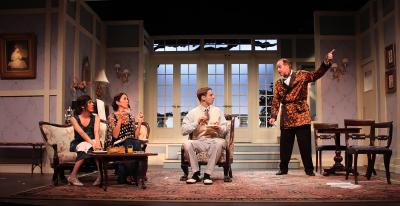Strange Pairings Occur in Hampton Theatre Company's 'Hay Fever'

The Hampton Theatre Company in Quogue finishes off its 30th season with “Hay Fever,” the Noel Coward comedy of English mores. Following two meatier pieces — “Time Stands Still” and “Clybourne Park” — “Hay Fever” provides a fitting bookend along with the opening comedic fluff of “Harvey,” showing that while the meat is the centerpiece, sometimes it’s the skin — crackling and crisp — that can highlight the meal.
Sir Noel loved to tell how he wrote “Hay Fever” in three days in 1925, and expressed astonishment up until his death over the play’s never-waning popularity. He wrote to one friend that “the play had no plot and there were few if any witty lines. . . . To me, the essence of good comedy writing is that perfectly ordinary phrases such as ‘Just fancy!’ should, by virtue of their context, achieve greater laughs than the most literate epigrams.”
The plot, what there is of it, follows the Blisses, a narcissistic and theatrical British family — mother, father, sister, brother — at their manor in the countryside over a weekend where each of them, unbeknownst to the others, has invited a guest of the opposite sex. When a “diplomatist,” a divorcée, a promising pugilist, and a flapper come down for the night, mayhem ensues, strange pairings occur, awkward silences abound, and there’s lots of talk about the weather. And tea.
As a writer, Sir Noel created his share of twisted characters as deep and rich as a fine Bordeaux (in particular Nicky, originally played by Coward himself in “The Vortex,” or Sir Hugo Latymer from “A Song At Twilight”), but “Hay Fever” offers up an asti spumante — light and bubbly without a lot of undertones. As Gertrude Stein might say, “There is no there there.” It’s somewhat surprising, actually, coming from a man who wrote perhaps the saddest torch song of all time, “If Love Were All.”
But this is “Who’s Afraid of Virginia Woolf?” light. There are no moments of denouement, no great reveals, and no heartfelt monologues. There are, however, plenty of giggles, mostly at the shockingly bad behavior of the hosts, whose insouciant rudeness and flagrant dramatics horrify their guests. Although the Blisses never notice, of course.
Quogue’s production is directed by a veteran H.T.C. board member, Diana Marbury, who steals each scene she’s in as the overwhelmed and under-impressed dresser-turned-maid, Clara. The Bliss family centers around the solipsistic Judith Bliss, a retired grande dame of the theater, “rusticating” and bored in her pastoral prison, played to perfection by Rosemary Cline. Judith has invited Sandy Tyrell as her boy toy for the weekend, a budding boxer portrayed by the H.T.C. newcomer Anthony Famulari with the expected blend of common courtesy and abject surprise at the weekend shenanigans.
“Didn’t she mean all she said?” Sandy inquires of Sorel Bliss, Judith’s daughter, played with appropriate petulance and prettiness by Gabriella Campagna. “No, not really,” Sorel replies. “We none of us ever mean anything,” summing up the Alice-in-Wonderland quality of a Saturday evening with the Blisses.
Also appearing in the cast are Andrew Botsford as David Bliss, the self-absorbed and bitter novelist and patriarch of the family, and Matthew Conlon as Richard Greatham, the “pet of the Foreign Office.” Both of these seasoned actors perform admirably, along with Bobby Peterson as the artistic and spoiled Simon Bliss, Jane Cortney as the visiting vamp Myra Arundel, and Amanda Griemsmann as the painfully shy flapper Jackie Coryton.
Peter-Tolin Baker’s powder-blue set offers a beautiful background for the goings-on, along with Sebastian Paczynski’s moody lighting foreshadowing the coming of a storm. Teresa LeBrun’s costumes harken to the styles of the 1920s with headdresses and long beads.
Those who choose to offer “Hay Fever” must tread a fine line between acting and over-acting; the production simply doesn’t work if everyone is over the top. There must be a clear delineation between the bohemian fireworks of the Bliss family and the bourgeois confusion of the guests. Sometimes this simply comes down to volume control. If everyone is speaking at the top of their lungs, it’s difficult to differentiate between who’s “on” and who’s flustered. There were moments in Quogue’s production where it would have been nice to turn down the guests and turn up the hosts, but those moments were few.
All in all, any shortcomings arise from the vacuousness of the upper classes, as the playwright presents them. Perhaps if he had taken one more day to write “Hay Fever,” it might have offered more than just a tickle in the throat.
